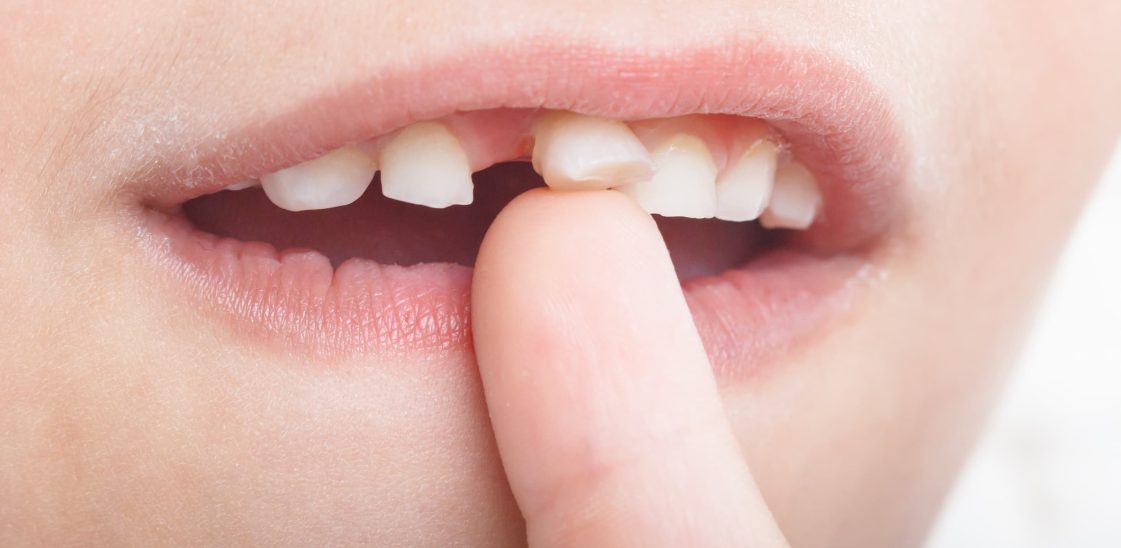
Can a loose tooth be saved?
If you or your child has a tooth that is loose or wobbly, you might wonder what can be done about it. Can it be saved, or is it a lost cause – and what should you do about it? In this article, we explore what you can do about a loose tooth.
Can a tooth that is loose be saved?
The prognosis for a loose tooth depends on the type of tooth involved, the extent of the damage and, in some cases, how the damage was caused. In this context, when we talk about types of teeth, we’re not making a distinction between incisors, canines and molars. Instead, it depends on whether the tooth involved is an adult tooth or a baby tooth.[1]
If it’s a milk tooth, it will be replaced by an adult tooth when it is ready, so it’s unlikely that treatment will be needed to stabilise the tooth. Unless you’re certain the tooth has become loose naturally as an adult tooth pushes up from beneath, you should still consult a dentist about the loose tooth, because they may be able to identify the cause of the issue and help you to resolve it if necessary before other teeth are affected. They’ll also be able to advise you if you need to do anything in particular to look after the loose tooth. If the looseness was caused by an injury, then it’s also worth checking that the damage didn’t have other consequences.[2]
Where adult teeth are affected, loose teeth can be saved in some circumstances. Not all loose teeth can be rescued, so it’s a good idea to speak to your dentist to understand the likelihood of success in your specific situation.
If your loose tooth was caused by injury, then one option is that dentists may be able to splint the tooth. Essentially, they’ll use a special wire and dental cement to attach the loose tooth to the stable teeth on either side of it. This holds the tooth in place while your mouth heals so that it settles in the correct position and stops being loose.
However, dental injuries can cause hidden complications that don’t always become immediately apparent. These can then lead to further degradation of the tooth, which may result in the tooth needing to be extracted or further surgery becoming necessary. If you regularly participate in activities that are likely to cause dental injuries, such as contact sports, there are things you can do to protect your teeth, such as using sports-grade mouth guards.
Additionally, you can get other mouth guards such as DenTek Comfort Fit Dental Guards, which are designed to shield your teeth against wear and tear by helping to limit the effects of teeth grinding at night.[1]
Alternatively, loose teeth can also be caused by oral health issues, such as gum disease. The solution to this will depend on the severity of the infection – and this will also affect whether or not the loose tooth can be saved.
For example, in the early stages of gum disease your dentist will likely advise you on improving your dental hygiene. This might include cleaning between your teeth using tools such as Dentek’s Eco Easy Brush, designed to help you reach those hard-to-clean areas of your mouth. Other suggestions might include giving up smoking if applicable, improving your diet and stopping bad habits like rinsing your mouth after brushing your teeth – a practice which can wash away the helpful fluorine from your toothpaste and prevent it from doing its job.
If your gum disease is more serious, more intense treatments may be necessary to try and save the tooth. In some cases, it’s even possible that the affected teeth may need to be removed altogether – although your dentist will try everything they can to save the tooth before resorting to extraction.[3]
What to do if your permanent tooth is loose
If you’ve had an injury that has led to your tooth or teeth feeling loose, you should seek medical attention immediately. As well as assessing the damage to your teeth, this will also help you to find out if there are other consequences to be aware of, such as head injuries or concussions.[4]
If your loose teeth have come about for no apparent reason – that is, you haven’t had a dental injury and it’s not a baby tooth falling out as your adult teeth develop – it’s important to speak to your dentist as soon as you can. You should get an urgent dentist appointment so that you can find the root cause of the issue and start planning how to rectify it as quickly as possible.[3]
In the meantime, try to avoid eating with the affected tooth, and keep the area as clean as possible by brushing with a soft-bristled toothbrush. Stick to soft foods as much as possible to avoid aggravating your loose tooth, and steer clear of contact sports and other high-contact activities. You should still see a dentist as soon as possible to get tailored advice and treatment.[5]
Resources
[3] – https://www.nhs.uk/conditions/gum-disease/
[4] – https://www.aae.org/patients/dental-symptoms/traumatic-dental-injuries/




